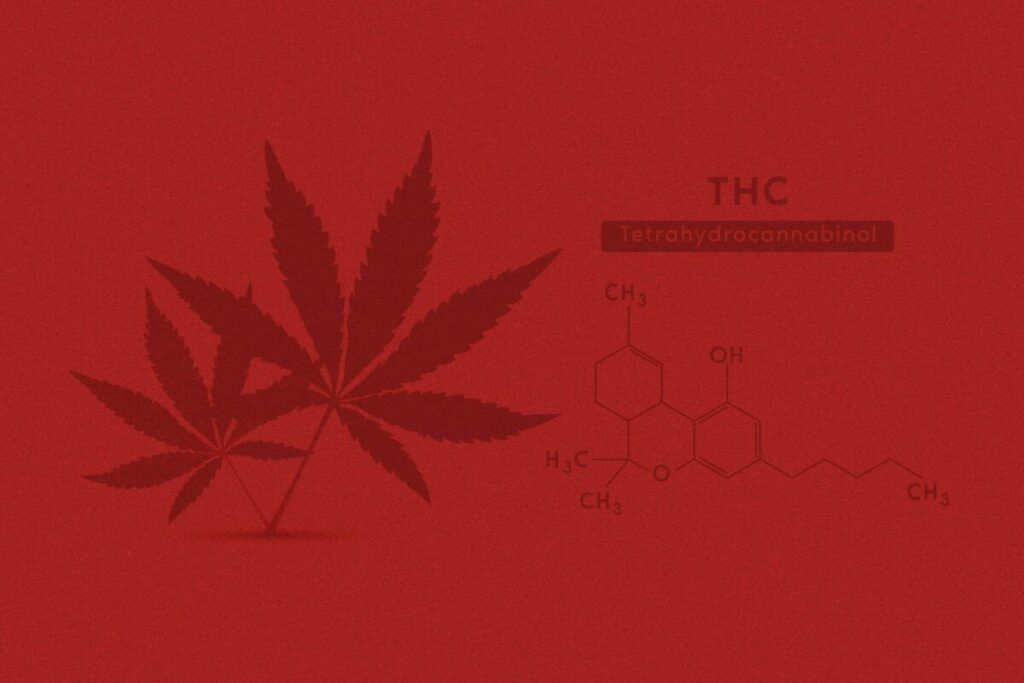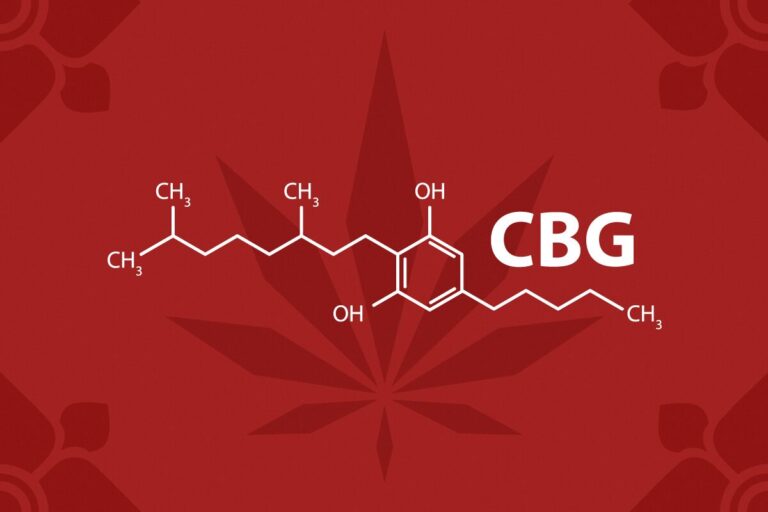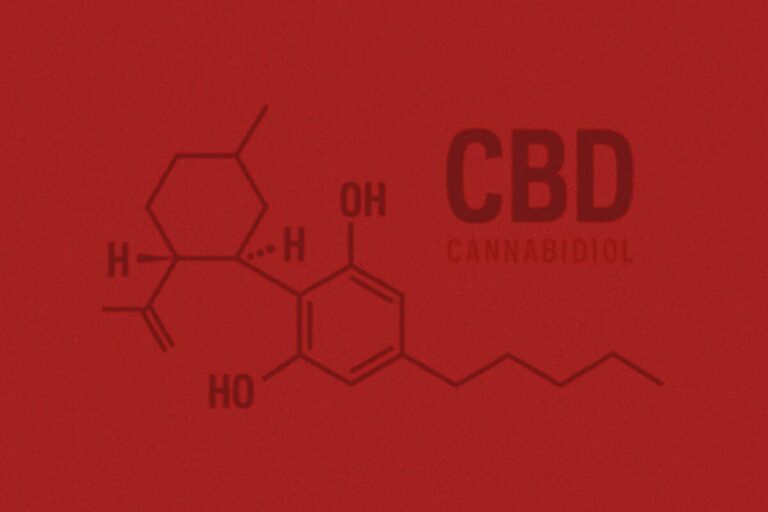Cannabis, or Cannabis sativa plants, produce a large number of chemical components known as cannabinoids, including THC, which is one of the key compounds together with its relative CBD (but that’s another article for another day, so stay tuned!).
Here is what you need to know about THC, from what it is to its potential risks and side effects and its health benefits.
Key Takeaways
- THC is an abbreviation for tetrahydrocannabinol, which is a main cannabinoid that exists in the cannabis plant that causes the high effect.
- THC has some therapeutic benefits such as pain relief, reduced nausea, and improved sleep.
- The risk of cannabis use can lead to impaired motor skills as well as other short-term and long-term effects.
- Popular THC strains include Cherry Pie, Dosidos, and Double Dawg.
- Some of the consumption methods for THC are smoking, vaping, oral ingestion, and dabbing.
- THC enhances social skills.
What is THC?
THC is short for tetrahydrocannabinol, the main compound of the cannabis plant’s flowers renowned for its psychoactive effects responsible for the euphoric feeling or “high” after being consumed. THC attaches to the cannabinoid receptors, chemicals made naturally by the human body, and affects human memory, movements, thinking, concentration, coordination, and time perception.
THC will build up in your body over time depending on how frequently you use it. Generally, THC can be detected for one to three days after last use in regular users and it can last up to 30 days or even longer in chronic users. Consuming methods can also determine how long THC remains in your body, to give an example, consuming THC edibles will stay in your body longer than vaping or smoking as it takes longer for your body to process. What’s more, it can make you happy by stimulating the cells in the brain to release dopamine, also known as a happy hormone, which creates euphoria.
Medical Use of THC
In the medical setting, THC is used to relieve symptoms of certain conditions. When the doctor prescribes THC, it usually starts at the lowest dose possible to prevent the incident of adverse events or unwanted outcomes. Some of the health benefits of THC are:
- Pain reliever
Medical cannabis is popular among patients seeking to relieve chronic pain. A 2015 study revealed that cannabis use in patients suffering from chronic pain and found THC helps with pain by approximately 40%.
- Reduce nausea from chemotherapy
Two oral THC-based medications, dronabinol and nabilone, have been approved by the Food and Drug Administration (FDA) for the treatment of chemotherapy-induced nausea and vomiting.
- Improve sleep
Cannabis is widely used as a sleeping aid among medical cannabis users as well as those who use it recreationally. THC products can improve short-term sleep problems and reduce sleep disturbances especially those living with muscle spasms and chronic pain.
Risks and Side Effects of THC
According to the National Institute on Drug Abuse (NIDA), THC can trigger a relapse in schizophrenic symptoms. The risk of consuming THC can also affect motor skills causing impaired driving or similar activities for approximately three hours after being consumed.
Side effects caused by THC can vary from person to person, it’s also depending on the dose taken and the product used. The effects that cannabis may cause can differentiate into short-term and long-term as follows:
Short-term effects
Many people experience euphoria or high sensation together with relaxation after cannabis consumption, however, experiences vary in each individual. It’s also common to experience feelings of anxiety and panic and other effects may include:
- Changes in time perception
- Mood changes
- Bloodshot eyes
- Increased heart rate
- Impaired body movement
Cannabis enthusiasts who use higher doses or chronic users may experience psychotic symptoms such as hallucinations and delusions.
Long-term effects
Cannabis use can also cause lasting consequences on brain development, especially in adolescents, which may lead to other long-term physical and mental issues including:
- Respiratory difficulties – Cannabis smoke can irritate the throat and lungs and frequent use over a long time increases symptoms such as cough, chronic bronchitis as well as other lung problems.
- Severe cyclic nausea and vomiting – Chronic use of cannabis can develop this rare condition called cannabinoid hyperemesis syndrome.
- Pregnancy risks – THC can pass from the mother to the child through breastfeeding which could impact fetal brain development and more likely to experience problems with attention, memory, and problem-solving.
- Psychiatric disorders – The use of cannabis can increase the risk of depression, anxiety, and schizophrenia.
- Testicular cancer – Cannabis use in adolescents can form aggressive testicular cancer.
Is THC addictive?
Roughly 30% of cannabis users will develop addiction according to the National Institute on Drug Abuse (NIDA) and cannabis use before the age of 18, during the brain-developing period, tends to increase the cannabis use disorder.
Signs of cannabis addiction:
- Strong cravings for cannabis.
- Loss of interest in activities.
- Withdrawal symptoms such as irritability or restlessness.
- Continue cannabis use despite negative consequences such as financial instability or dropping out of school.
Impact on Social Skills
THC may sound negative to many of you; however, there’s more positive impact than just its medicinal benefits. The research findings of 146 healthy young adults between 18 and 25 years cannabis compared to THC-free users revealed an interesting result. It discovered that the people who had used cannabis recently were more likely to show care and fairness towards others. However, this tendency diminished as more time passed after their cannabis use. Another exciting finding of cannabis usage is that it induces prosocial behaviors such as empathy, benevolence, and fairness.
THC vs CBD
THC (tetrahydrocannabinol) and CBD (cannabidiol) are siblings, and the two most common cannabinoids produced by the Cannabis sativa plant among over 100 cannabinoids. (THC vs CBD) Both of them are psychoactive meaning that they affect the human brain, however, CBD doesn’t make you high while THC is the main reason that makes you intoxicated.
THC and CBD come from the same cannabis plant. But CBD generally comes from another type of cannabis called hemp, which usually contains very low THC levels (less than 0.3%), and cannabis plants that produce more than 0.3% THC are called marijuana.
THC Consumption Methods
There are many different ways to consume cannabis. The methods are just the same as those who use it recreationally as well as in medical cannabis patients.
- Smoking – The most common and classic way to consume cannabis, especially among those who use it for recreational purposes. To smoke cannabis is to roll it with a rolling paper into a cigarette (joint). Another alternative way to smoke cannabis is through a water filtration device known as a bong.
- Vaping – This newer method of consuming cannabis produces a better high with less cannabis smell compared to smoking and vaporizers usually come in small sizes which are easier to conceal and carry.
- Dabbing – This method is similar to vaping but it uses THC resin extracted from the cannabis plant. Dabbing will instantly make you high, unlike smoking. The THC is more concentrated in this method which means it tends to produce a stronger high.
- Oral Ingestion – The method includes everything that you need to put in your mouth from home-baked brownies, cookies, and gummies (edibles) to cooking oils extracted from cannabis.
- Sprays – Spray is a THC-infused liquid used by taking it under the tongue. This consuming method is typically used among medical cannabis users to avoid the harmful effects of smoking.
- Tinctures – They are another type of liquid extracted from cannabis but infused with alcohol or alcohol and water. Taking tinctures is the same way as the spray, which places a few drops under the tongue. This method has a highly potent and fast-acting effect.
- Topical – Topical can be oils or even lotions which are extracted from cannabis plants but they are thicker than the ones used in edibles. This method is meant to put directly onto the skin.
THC Cannabis Strains
Cannabis nowadays is very strong and many breeders are continuously creating new strains with high percentages of THC. Here are the strains with 20% THC or more available on the market today:
Kosher Kush
Kosher Kush or “Kosher OG” is an Indica cannabis strain that originated in Los Angeles as a clone-only strain from DNA Genetics. The strain produces THC levels around 21% and has been a winner of the High Times Cannabis Cup’s Best Indica in 2010 and 2011. People tend to use this strain for stress, depression, and anxiety.
Gorilla Glue
Gorilla Glue is a hybrid strain made by a genetic cross between Chem’s Sister, Sour Dubb, and Chocolate Diesel. The strain produces a high potent THC level which usually ranges from 25% to 32%. The Gorilla Glue strain won several awards, including first place in the Michigan and Los Angeles 2014 Cannabis Cups and the High Times Jamaican World Cup in 2015. It’s mostly used for relaxing and stress relief.
Lemon Meringue
Lemon Meringue is a Sativa strain that the famous Exotic Genetix originally bred from the crossbreeding between Lemon Skunk and Cookies & Cream strains. The strain is another high-potency strain with a THC level of 27.7% and is being used for fatigue, mild headaches, and stress.
THC Legality in Thailand
Since 9th June 2022, Thailand has removed cannabis from the Category 5 narcotics list. Therefore, cannabis is quite freely traded, possessed, and consumed only when the THC level is not more than 0.2% by weight. Possessing and selling cannabis extracts containing more than 0.2% THC without permission or a medical prescription is illegal. Even though cannabis is legal in Thailand, however, the law doesn’t entirely give you freedom to use cannabis. Smoking cannabis in public is not permitted and can lead to issues like fines and jail time if caught. Carrying cannabis from and to Thailand for personal purposes is also prohibited.
THC products at MedMen Bangkok
THC products sold at MedMen Bangkok have been raised with utmost care and dedication throughout all growing stages before being selected through pheno-hunting to achieve distinctive terpene profiles. This ensures that the products maintain their medical standard with dense bud structures rich in trichomes and are completely free from all harmful contaminants, including pesticides and herbicides. Some of MedMen’s partners include Medicana Lab, one of the first FDA-approved indoor cultivation facilities in Thailand, and here are some of the strains you can find at MedMen’s Bangkok dispensary:
Double Dawg
Bred by the Top Dawg Seeds through the back-crossing Dawgwalker OG with itself created this Sativa-dominant hybrid named Double Dawg. This strain produces a high THC level with an herbal and earthy aroma.
Key Characteristics:
THC Content: About 29.76%
Strain Type: Sativa hybrid
Genetics: The strain was created by back-crossing the Dawgwalker OG with itself.
Terpenes: Limonene, Humulene, Terpinolene
Effects: Relaxed, Uplifted
Dosidos
The Dosidos was bred in Denver, Colorado by Archive Seeds by the crossbreeding between Girl Scout Cookies and Face Off OG strains. This perfect balance of 50/50 hybrid strain has a woodsy and sweet aroma that makes you feel stress-free and relaxed.
Key Characteristics:
THC Content: About 26.03%
Strain Type: 50/50 hybrid
Genetics: Girl Scout Cookies, Face Off OG
Terpenes: Myrcene, Limonene, Caryophyllene, Linalool
Effects: Hungry, Relaxed, Sleepy
Cherry Pie
Cherry Pie is believed to be bred by a grower in the Bay Area of California known as PieGuy by crossing the famous Granddaddy Purple with the F1 Durb strain. The strain is an Indica-dominant hybrid that produces a sweet berry and fruity aroma.
Key Characteristics:
THC Content: About 25.11%
Strain Type: Indica hybrid
Genetics: Granddaddy Purple, F1 Durb
Terpenes: Myrcene, Limonene, Beta-Caryophyllene
Effects: Relaxed, Sleepy, Uplift
Conclusion
THC is one of the several cannabinoids produced by the flowers of the cannabis plants. It’s known to be the main psychoactive effect of the plant that makes you feel euphoric. With its being psychoactive, of course, it has many risks and side effects. To give an example, THC can trigger schizophrenic symptoms and can cause impaired driving skills.
After consuming cannabis, users may experience short-term effects such as bloodshot eyes and changes in time perception, and chronic users may experience long-term consequences such as psychiatric disorders and testicular cancer. THC can be used to treat those who seek pain relief and patients with chemotherapy side effects such as nausea, and it can also be used as a sleeping aid.
More about THC you might want to explore!





